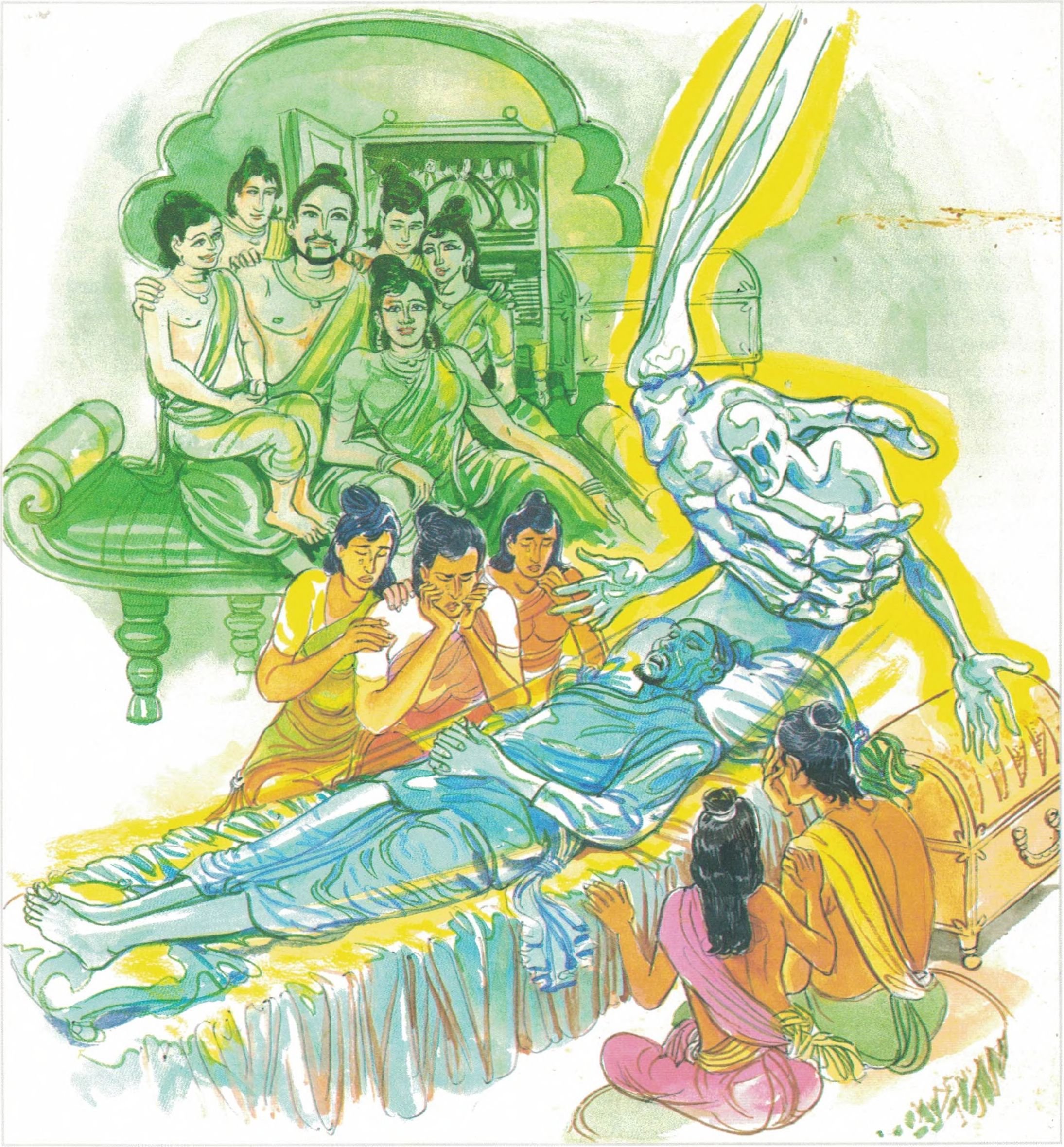Dhammapada (Illustrated)
by Ven. Weagoda Sarada Maha Thero | 1993 | 341,201 words | ISBN-10: 9810049382 | ISBN-13: 9789810049386
This page describes The Story of Ananda, the Rich Man which is verse 62 of the English translation of the Dhammapada which forms a part of the Sutta Pitaka of the Buddhist canon of literature. Presenting the fundamental basics of the Buddhist way of life, the Dhammapada is a collection of 423 stanzas. This verse 62 is part of the Bāla Vagga (Fools) and the moral of the story is “The unwise man prides over his children and his wealth. But he has not even himself”.
Verse 62 - The Story of Ānanda, the Rich Man
Pali text, illustration and English translation of Dhammapada verse 62:
puttā matthi dhanammatthi iti bālo vihaññati |
attā hi attano natthi kuto puttā kuto dhanaṃ || 62 ||
62. “Sons have I, wealth have I”, thus the fool is fretful. He himself is not his own, how then are sons, how wealth?
 The unwise man prides over his children and his wealth. But he has not even himself. |
The Story of Ānanda, the Rich Man
While residing at the Jetavana Monastery, the Buddha spoke this verse, with reference to a miserly rich man, named Ānanda.
There was once a very wealthy man named Ānanda in Sāvatthi. Although he possessed eighty billion, he was very reluctant to give anything in charity. To his son, Mūlasiri, he used to say, “Don’t think the wealth we have now is very much. Do not give away anything from what you have, for you must make it grow. Otherwise, your wealth will dwindle.” This rich man had five pots of gold buried in his house and he died without revealing their location to his son.
Ānanda, the rich man, was reborn in a village of beggars, not far from Sāvatthi. From the time his mother was pregnant, the income of the beggars decreased; the villagers thought there must be a wicked and unlucky one amongst them. By dividing themselves up into groups and by the process of elimination, they came to the conclusion that the pregnant beggar woman must be the unfortunate one. Thus, she was driven out of the village. When her son was born, the son proved to be extremely ugly and repulsive. His hands and feet and eyes and ears and nose and mouth were not where they should have been. Terrible looking that he was, he looked like a mud spirit. In spite of this, however, his mother did not abandon him, for great is the love of a mother for the child she has carried in her womb. If she went out begging by herself, she would get alms as before, but if she went out with her son she would get nothing. So, when the boy could go out by himself, his mother placed a plate in his hand and left him, saying, “Dear son, because of you we have been brought to great distress. Now we can support you no longer. In this city meals are provided for poor folk and travellers. Get your living by begging for alms in this town.” As he wandered about in Sāvatthi, he remembered his old house and his past existence. So he went into the house. When the sons of his son Mūlasiri saw him, they were frightened by his ugly looks and began to cry. The servants then beat him and threw him out of the house.
The Buddha who was on his alms-round saw the incident and asked Venerable Ānanda to fetch Mūlasiri. When Mūlasiri came, the Buddha told him that the young beggar was his own father in his previous existence. But Mūlasiri could not believe it. So, the Buddha directed the beggar boy to show where he had buried his five pots of gold. Then only, Mūlasiri accepted the truth and from that time he became a devoted lay-disciple of the Buddha.
Explanatory Translation (Verse 62)
me puttā atthi me dhanaṃ atthi iti bālo vihaññati
attā hi attano natthi puttā kuto dhanaṃ kuto
me: I; puttā atthi: have sons; me: I; dhanaṃ atthi: have wealth; iti: this way; bālo: the fool; vihaññati: worries; attā hi: one’s own self; attano natthi: one does not have; puttā: sons; kuto: how can that be; dhanaṃ [dhana]: wealth; kuto: how can that be.
The fool worries “I have sons,” “I have wealth.” When his self is not his own, then how can he claim, “I have sons” or “I have wealth”?
Commentary and exegetical material (Verse 62)
attā hi attano natthi: the fools tax themselves, thinking that they have sons, they have wealth. But, in reality, their selves are not their own. If their ‘self’ were their own, they could control it as they wished. But they grow old; they decay; they fall ill; unexpected things happen to them, so how can they think that they possess themselves?
Grains, wealth, silver, gold and whatever property there is; slaves, craftsmen, hired menials and all the dependant ones–
All these have to be abandoned when leaving. But whatever one does through deed, word or thought–
That alone belongs to him; that alone he takes with him and that alone follows him like the inseparable shadow.
All beings die. Life ends in death. Beings fare according to their deeds, experiencing the results of their meritorious and sinful deeds. Those who do sinful deeds go to the woeful states and those who do meritorious deeds, attain blissful states. Therefore, let one always do good deeds, which serve as a store for life elsewhere. Meritorious deeds are a great support to beings in the future world.
